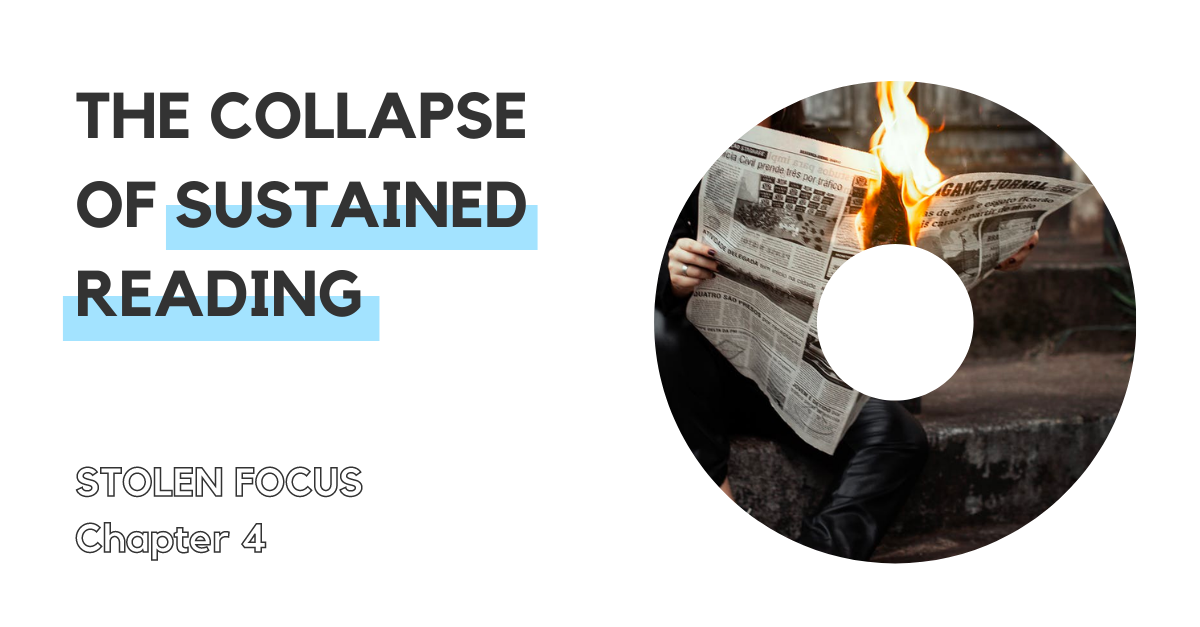‘the quality of your thinking will rapidly degrade’ – Stolen Focus, Chapter 4 Notes
Posted on: June 5, 2022
Post Category: Book Notes

About #onepageonepoint
#onepageonepoint aims to summarise new ideas from books on personal and professional development – with (approximately) one point for each page. Read more about this project here.
Today for #onepageonepoint, we have summary notes for Stolen Focus – for chapter 4: ‘Cause 4: The Collapse of Sustained Reading’.
If you are interested in getting yourself a copy or learn more about the book, click here.
Chapter 4: ‘Cause Four: The Collapse of Sustained Reading’
- During Hari’s detox, he chatted with the female cashier at a bookstore: ‘Here was an intelligent young woman with lots of time, surrounded by many of the best books ever written, and with a desire to read them – but she could only get through the first chapter or two, and then her attention puttered out, like a failing engine’ (Hari 2022, p. 75).
- David Ulin, book critic and editor at the Los Angeles Times for more than thirty years, also lost his ability to read deeply over long periods because he keeps getting distracted by ‘the buzz of online conversation’ (Hari 2022, p. 75).
- From many different surveys and statistics, the amount of time spent on reading for pleasure for Americans has decreased, the market for paperback fiction is decreasing, and the average American (as of 2017) spends 5.4 hours on mobile as opposed to 17 minutes reading – with some 57 percent of Americans now not reading a single book in a typical year.
- In Mihaly’s research, reading was discovered as being as one of the most common experiences where people get into the flow state.
- Anne Mangen, professor of literacy at Stavanger University in Norway, explains that reading books trains us to read in a particular linear fashion, while reading on screens trains us to skip and skim – and this can bleed into how we read on paper.
- In Mangen’s study comparing and testing participants who read information on paper versus on a screen: people who read material on paper remember and understand more content versus a screen – this is a broad scientific effect called ‘screen inferiority’. ‘The gap in understanding between books and screens is big enough that in elementary-school children, it’s equivalent of two-thirds of a year’s growth in reading comprehension’ (Hari 2022, p. 78).
- Mangen expresses worry that we are losing our ability to read long texts and that we are losing the cognitive patience and stamina to deal with cognitively-challenging texts.
- ‘The medium is the message’ (a quote from Marshall McLuhan, a Canadian professor, on the introduction of the television) explains that a new medium is like a new set of goggles that makes us see things differently – it teaches us how to see the world.
- ‘TV teaches you that the world is fast; that it’s about surfaces and appearances; that everything in the world is happening all at once’ (Hari 2022, p. 79).
- Twitter teaches you that the world can be understood in short, simple sentences, that the world should be confidently interpreted and understood quickly, and that a successful statement is one that is applauded for quickly by many people.
- Facebook teaches you that your life exists to be displayed to other people in a highlight reel, what matters is whether people immediately like these edited selected highlights, and that a ‘friend’ is someone who shares their highlights with you and looks at your highlights.
- Instagram teaches you what matters is how you look on the outside.
- Hari believes that these messages conveyed from social media are wrong – out of joint with the world and with ourselves; ultimately, the world is complicated and takes focussed attention to understand, and ‘if [social media] becomes your dominant mode of absorbing information, I believe the quality of your thinking will rapidly degrade’ (Hari 2022, p. 80) – when it comes to learning, seeing the world and interacting with friends.
- Hari believes books teach us that life is complex and takes time to understand, that there is value leaving your concerns behind to focus on something (i.e. the pages of a book), and that it is worth thinking about how other people think and live.
- For an experiment by Raymond Mar (professor of psychology at the University of Toronto), his team discovered that people who read more novels were better at reading other people’s emotions and social signs, compared to people who read non-fiction books – Mar explained this result by suggesting that novel readers have a stronger tendency to ‘imagine what it is like to be another person’.
- The findings from this study, however, are controversial, as it can be argued that empathic people might be drawn to read fiction versus reading fiction makes people more empathetic. However in one of his other studies, it was found that children who read storybooks chosen by their parents can interpret emotions better.
- Another study of Mar found that long complex narratives are better for empathy – ‘children are more empathetic if they read storybooks or watch movies, but not if they watch shorter shows’ (Hari 2022, p. 85).
- ‘We internalise the texture of the voices we’re exposed to – when you expose yourself to complex stories about the inner lives of others, you will be more perceptive open and empathetic, but when you expose yourself to disconnected fragments of social media, you will be more cruder and louder’ (Hari 2022, p. 85).
If you are interested in getting yourself a copy or learn more about the book, click here.
Interested in reading more? See my notes for Chapter 5.

About the author
Jason Khu is the creator of Data & Development Deep Dives and currently a Data Analyst at Quantium.